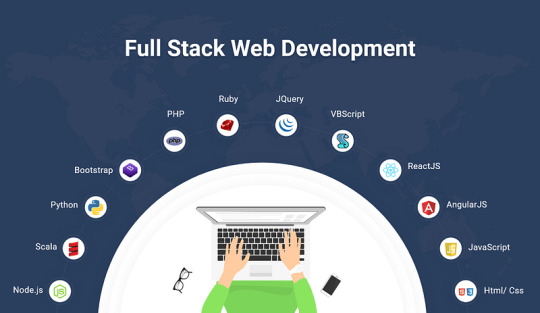#fullstackdevlopmenttraining
Explore tagged Tumblr posts
Text
What is The Scope of Full-Stack Development Career in India?
Are you interested in Full-Stack Development? Do you want to know what the future of Full-Stack Development has in-store for you? Here’s a complete analysis of the scope of Full-Stack Development Career in India.

If you are reading this blog, chances are you are interested in full-stack development or you are looking to enroll for full-stack development training and want to decide if you should.
Full-stack is one of the newest demands in the IT industry. Companies today want professionals who can perform multiple sides of software development such as development, design, and database management single-handedly instead of opting for separate individuals of specialist software developers.
In simplest terms:
Full-Stack = Back-End + Front-End
Back-End
Back-End: Back-end development focuses on the side of the website users can’t see, also called as the server-side of a website.
● Building Code
● Troubleshooting and debugging web applications
● Database management
● Framework utilisation
Back-end technologies
● PHP server-side scripting
● Java
● Python
● Express
● Django
● Rails
● Laravel
● Spring
Back-end Skill
● In-depth knowledge in server-side programming languages such as Python, PHP and work with its own frameworks such as Django and CakePHP. Use language features such-as lists, sets, and dictionaries appropriately for simple algorithmic tasks.
● Become adept at interacting with other technologies such as databases, servers etc.
● Identify and fix performance bottlenecks in web apps. Propose a suitable fix to specific problems.
● Make apps load and run faster, more secure, more stable and more capable.
Front-End
Front-End: Front-end development focuses on the side of the website users interact with which commonly includes the visual elements of a website or an app, also called as the client-side of the website.
● Buttons
● Layouts
● Navigation
● Images
● Graphics
● Animation
● Content management
Front-end technologies
● HTML
● CSS
● JavaScript
● AngularJS
● ReactJS
● JQuery
● SaSS
Front-end skills:
● Design engaging solutions. Design create and modify static web pages conforming HTML5 specifications.
● Analyse the client-side performance of a webpage.
● Design webpages for better consumer experience.
● Create and deploy interactive and mobile-friendly web apps using the latest web technologies such as HTML5, CSS3, JavaScript and React.
● Work effectively and collaborate on a software project.
Full-Stack Development Payscale
According to an article on Payscale, the starting salary for full stack developers can be avg. INR 4 LPA for freshers and can go up to avg. INR 12 LPA for 4-5 years experienced professionals.
Average salary of full-stack developers in India is INR 9 LPA, whereas for front-end developers is between INR 5 to 6 LPA. For back-end developers the average salary is INR 7 LPA.
Top Reasons Why Companies Prefer Full-Stack Developers?
Fewer Resources: A full-stack developer expertises not only in front-end and back-end development but also on a variety of other technologies making them highly sought after by companies as only a handful of full-stack developers can do the work of a dozen of other types of developers.
Diverse Knowledge: Due to their diverse skill, they become an important asset to software development companies. They are highly skilled in multitasking and can handle multiple projects from varied industries. Their ability to juggle multiple projects make them exceptionally demanding.
Quality of Web Apps: Only a small team of full-stack developers can handle large projects which makes the development process more effective and error-free. There is little chance of human errors when all aspects of the project development is handled only by a small number of professionals.
Flexibility: Full-stack developers have the right technical knowledge that makes them adaptable to any situation during the development process. They can deal with unpredictable scenarios rather easily than specialist developers.
A full-stack developer is a valuable asset to development companies. With rapid advancements in software products, employers need a single professional who can do multiple tasks rather than individual professionals who can perform only one task. If you too want to become a full-stack developer you should enrol for a full-stack development training course in your city.
0 notes